
Local SEO isn't just about ranking higher—it's about capturing customers at the moment of highest intent.
Open a new tab and search for any of these competitive Colorado Springs local SEO terms:
To maximize your local search visibility across all devices and search methods, we focus on the key ranking factors that influence Google's local results:
Most SEO companies spread their efforts thin across too many strategies with minimal impact on local rankings. At Casey's SEO, we specialize exclusively in local SEO optimization with a focus on modern search behaviors:
We understand the unique dynamics of local search in Colorado Springs and beyond, including neighborhood-specific optimization and local community engagement strategies that boost your local SEO performance.
While we're based in Colorado Springs, we provide comprehensive local SEO and 'near me' search optimization services to businesses throughout the United States:
Our local SEO strategies are adaptable to the unique characteristics of different local markets, from small town businesses to competitive urban markets. Whether you need to dominate local search in a rural Colorado town or compete in a major metropolitan area, our local SEO expertise delivers results.
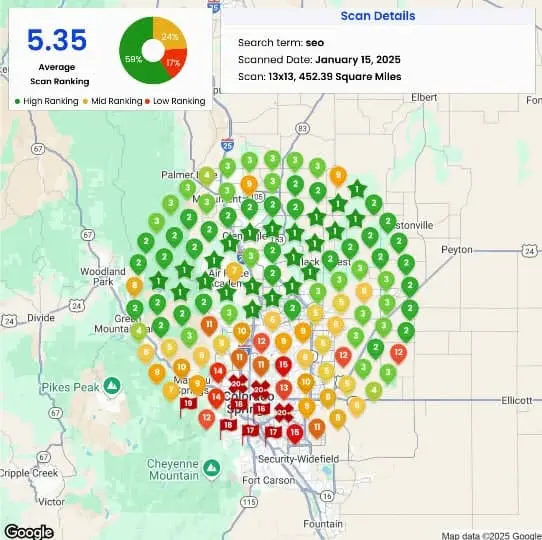
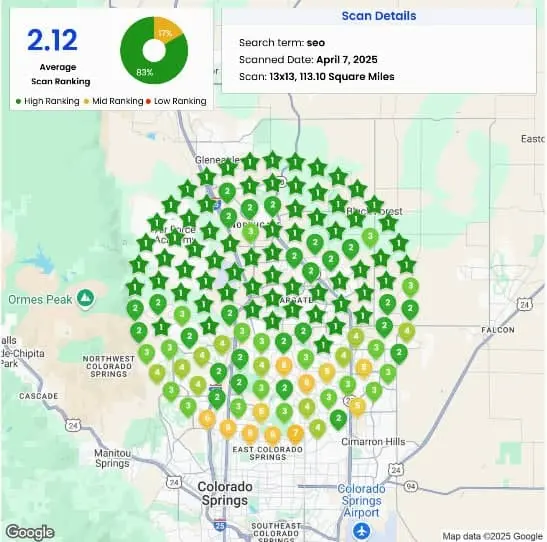
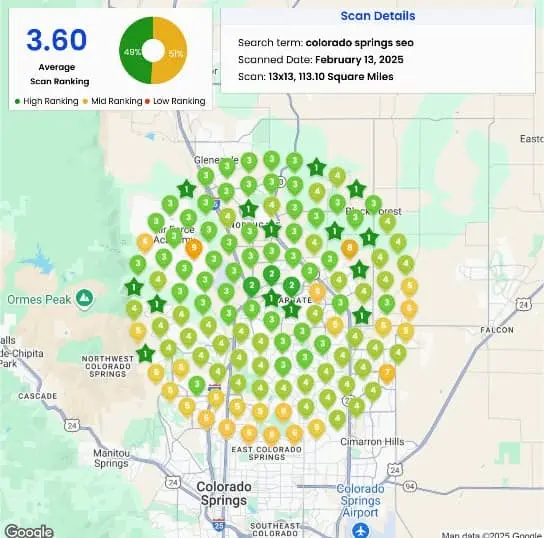



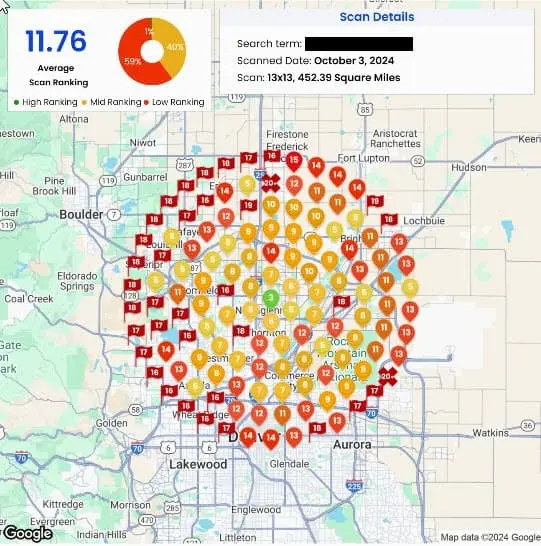
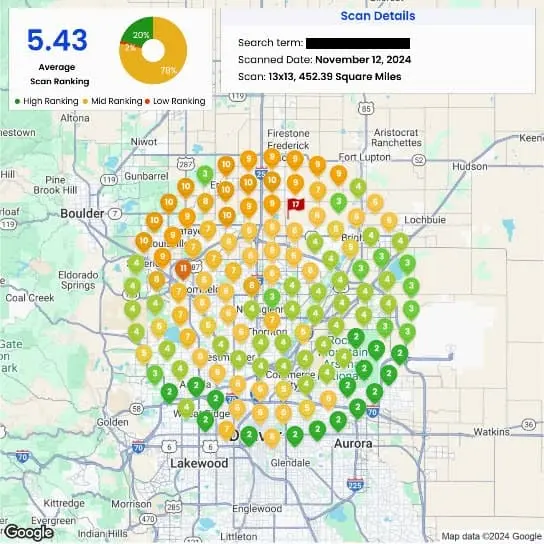
All scans were ran during business hours
These results show our consistent #1 rankings across multiple competitive Colorado Springs SEO keywords, demonstrating the effectiveness of our local SEO strategies.
Our Colorado Springs local SEO agency offers customized plans based on your specific neighborhood targeting needs:
Complete local search optimization focused on improving your local map pack rankings, Google Business Profile optimization, and 'near me' search visibility.
Includes:
Google Business Profile optimization & ongoing management
Local keyword research & 'near me' search targeting
Basic local citation building & NAP consistency
Mobile-first website optimization review
Monthly local ranking reports & analytics
Review management system setup
/month
BUYPerfect for: Single-location businesses in low to medium competition markets looking to improve local search visibility and attract more 'near me' searches.
Minimal website updates will be done.
Comprehensive local search domination for multi-location businesses including advanced Google Business Profile optimization, local landing page creation, and competitive local market targeting.
Includes: Everything in Basic Plan
2-3 location optimization with individual local landing pages
Advanced local citation building campaign
Schema markup & structured data implementation
Voice search optimization strategies
Hyperlocal content creation
Competitive local SEO analysis
/month
BUYPerfect for: Multi-location businesses or single locations in competitive markets needing comprehensive local search visibility.
Minimal website updates will be done.
Enterprise-level local SEO with maximum locations coverage, advanced technical implementation, and aggressive local market domination strategies.
Includes: Everything in Advanced Plan
3-5 location optimization with full local landing page suite
Advanced schema markup & technical SEO implementation
Local link building & community outreach
AI-powered local search optimization
Priority support & monthly strategy consultations
Advanced local analytics & reporting dashboard
/month
BUYPerfect for: Enterprise businesses, franchises, or highly competitive local markets requiring maximum local search visibility and market share capture.
Minimal website updates will be done.
Discover how your Colorado business ranks against local competitors with our comprehensive local SEO analysis. Our Colorado Springs SEO specialists will evaluate your Google Business Profile, local citations, and competitive landscape.
Complete the form below for your FREE Custom Local SEO Audit from Colorado's top-rated local search agency.
(Requires an active Google Business Profile for complete analysis)
Local SEO is a specialized strategy focused on optimizing your online presence to attract more customers from relevant local searches. It's crucial for businesses that serve specific geographic areas because it helps you appear in Google Maps, local pack results, and localized organic search results. Unlike general SEO, local SEO targets customers in your service area who are actively looking for your products or services, making these leads more valuable and likely to convert.
We optimize for 'near me' searches by targeting location-specific keywords, optimizing your Google Business Profile for local queries, and ensuring your website content includes natural language that matches how people speak when using voice search. Our local SEO strategies focus on conversational queries like "Where's the best pizza place near me?" rather than just "pizza restaurant," making your business visible when local customers search using mobile and voice assistants.
NAP stands for Name, Address, and Phone number. NAP consistency means ensuring your business information appears exactly the same across all online directories, your website, and your Google Business Profile. Inconsistent NAP information confuses search engines and can hurt your local rankings significantly. Our local SEO process includes thorough NAP auditing and correction across all platforms.
Local map pack optimization involves a combination of Google Business Profile optimization, local citation building, review management, proximity factors, and ensuring your business appears in the top 3 local results for relevant searches. We focus on the specific ranking factors that influence map pack placement, which is essential for local SEO success since most mobile users click on these results first.
Yes, we implement Local Business schema markup and other relevant structured data to help search engines understand your business type, location, hours, services, and contact information. This technical SEO element is crucial for local search visibility and rich snippet opportunities that enhance your appearance in search results.
Results can vary based on your industry competitiveness and starting point, but most businesses see measurable improvements in Google Maps and local organic rankings within 30-60 days. Significant increases in local leads and sales typically occur in the 3-6 month timeframe as your optimizations compound. Highly competitive industries may require 6-12 months of consistent effort. Either way, we provide regular reporting on your key metrics like rankings, visibility, calls, and conversions.
Unlike most SEO companies that spread their efforts across dozens of tactics with minimal impact, we specialize exclusively in local search optimization. We prioritize Google Business Profile optimization and other high-impact local strategies that directly influence your visibility to nearby customers. Our approach is results-driven, focusing on metrics that matter—like lead generation and new customers—rather than vanity metrics that don't impact your bottom line. Additionally, we offer customized strategies based on your specific location and industry challenges.
While having a website is beneficial and recommended, it's not absolutely required to improve your local search visibility. Some businesses can achieve significant local ranking improvements through proper Google Business Profile optimization and local citation management. However, having a website—even a simple one—provides additional opportunities to rank for more keywords and convert visitors into customers. If you don't currently have a website, we can discuss options including our website development services.
Though we're based in Colorado Springs, we provide local SEO services to businesses throughout the United States. We currently work with clients in Colorado Springs, Pueblo, Denver, Dallas, and many other cities nationwide. Our strategies are adaptable to the unique characteristics of different local markets, allowing us to deliver results regardless of your location.
Our local SEO services start at $999 per month for our Basic Local Plan, which is ideal for single-location businesses. We also offer more comprehensive local SEO plans for businesses with multiple locations or those in highly competitive markets. Each plan is customized based on your specific goals, competitiveness, and market conditions. We believe in transparent pricing and delivering clear ROI for our local SEO clients.
No, we don't lock you into long-term contracts. Our services are month-to-month with a 30-day cancellation notice. However, we do recommend committing to at least three months of service to give our strategies sufficient time to show meaningful results. SEO is an ongoing process, and the most significant benefits come from consistent, sustained efforts.
We track several key performance indicators, including:
We provide regular reporting on these metrics and focus on the ones that directly impact your business growth.
While we can achieve results without access, having access to your Google Business Profile and website allows us to implement more comprehensive optimizations. That said, many of our strategies focus on off-page factors that don't require direct access to your assets. If you prefer to maintain exclusive access to these properties, we can provide detailed recommendations for your team to implement.
Local SEO focuses specifically on optimizing visibility for geographically-specific searches with local intent – i.e. people looking for businesses, services, or products near them. It prioritizes different ranking factors like proximity, local citations, Google Business Profile optimization, and local link building. National SEO targets broader, non-location searches and relies more heavily on overall website authority and content quality.
Results can vary based on your industry competitiveness and starting point, but most businesses see measurable improvements in Google Maps and local organic rankings within 30-60 days. Significant increases in local leads and sales typically occur in the 3-6 month timeframe as your local SEO optimizations compound. Highly competitive industries may require 6-12 months of consistent effort, but we provide regular reporting on your key metrics like rankings, visibility, calls, and conversions.
The best way to get started is to request our free Local Rankings Audit. This comprehensive analysis will show how your business currently performs in local search, identify opportunities for improvement, and help us develop a customized strategy for your specific situation. After the audit, we'll discuss which of our service plans best fits your needs and goals. You can request an audit by filling out the form on this page or contacting us directly.
Coming Soon
